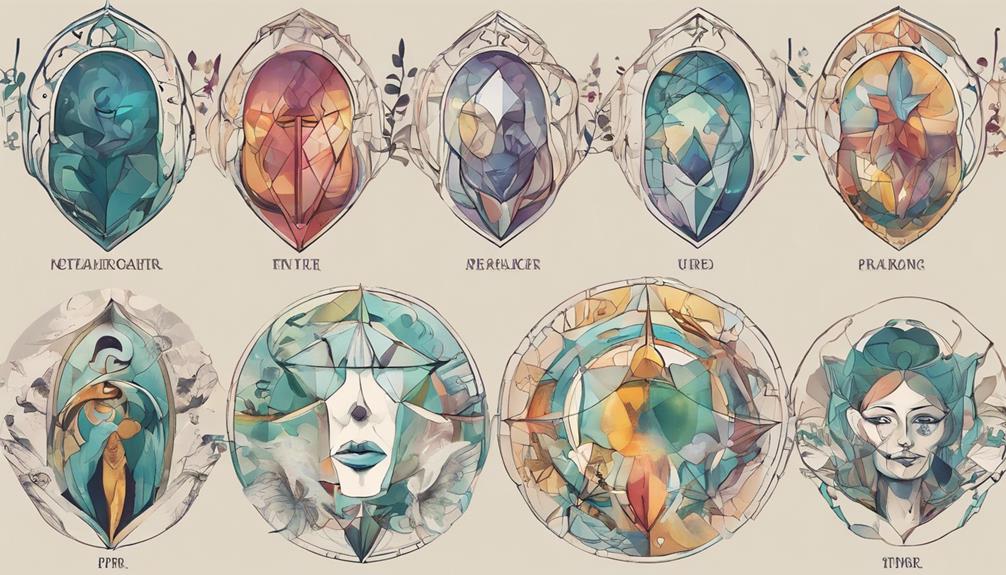As we explore the complex web of human characters, it’s like unwinding a colorful array of characteristics that mold our interactions and how we perceive things.
From the enigmatic allure of the rarest types to the familiar comfort of the more prevalent ones, each personality type paints a unique portrait of individuality.
As we explore the nuances of the 7 most common personality types ranked, we begin to grasp the intricacies that define our approach to life and relationships.
Intriguingly, these rankings offer a glimpse into the diverse array of personalities that color our world, sparking a curiosity to delve deeper into the depths of human nature.
Key Takeaways
- Extroverts and introverts are the two largest personality groups, each with distinct social preferences.
- Introverts gravitate towards deeper, one-on-one conversations and value solitude for recharging.
- Thinkers are a rare, analytical group excelling in strategic planning and problem-solving.
- Feelers, a majority, prioritize emotions, empathy, and meaningful connections in decision-making.
Extroverts
Extroverts, comprising nearly half of the population, exude a natural affinity for social engagement and thrive on interpersonal interactions. Their outgoing nature isn't just a personality trait but a fundamental aspect of their being. Expressive and energized by interactions, extroverts find fulfillment in social settings where they can engage with others. They're the life of the party, the ones who effortlessly strike up conversations and enjoy being the center of attention in group settings. This common personality type is often seen as enthusiastic, engaging, and vibrant in social gatherings.
For extroverts, social interactions act as a source of energy and stimulation. They seek out opportunities to connect with others and are naturally drawn to dynamic environments where they can express themselves freely. Their talkative and expressive nature often makes them natural leaders in group activities. Understanding the prevalence of extroverts in society sheds light on the importance of social connections and the diverse ways individuals engage with the world around them.
Introverts

As we shift our focus to introverts, it's important to recognize their unique behavior in social settings.
Introverts often prefer intimate gatherings or one-on-one interactions over large crowds, where they can engage in more meaningful conversations.
Understanding their communication preferences can lead to more fulfilling interactions and relationships.
Introverts in Social Settings
Representing a majority of the population at 61.2%, introverts often navigate social settings differently, preferring deeper conversations and finding solace in solitude or small group interactions. While social gatherings can be draining for introverts, they excel in creating meaningful connections through their unique perspectives and strengths.
Understanding that introverts recharge in solitude and thrive in inclusive environments is crucial for fostering their well-being in social settings. By valuing their preference for quality conversations over small talk, we can create spaces where introverts feel comfortable expressing themselves authentically.
Embracing the diverse ways individuals engage socially, including introverts' preference for deeper interactions, enriches our interactions and promotes a more inclusive and understanding community.
Introverts' Communication Preferences
Exploring the nuances of introverts' communication preferences unveils their inclination towards written forms of expression for reflection and thoughtful responses. When delving into the realm of introverts' communication styles, we find that:
- Written Communication: Introverts tend to prefer written communication over verbal communication, enabling them to reflect and respond thoughtfully.
- Group Discussions: They may find group discussions draining and lean towards one-on-one conversations or small group settings.
- Professional Roles: Introverts may excel in written communication roles such as writing, editing, or online content creation.
- Deep Conversations: They value deep, meaningful conversations and may struggle with small talk or superficial interactions.
- Expressing Thoughts: Introverts often express themselves better through writing, allowing for clearer and more concise articulation of their thoughts.
Thinkers
Thinkers, such as the INTJ personality type, are characterized by their logical and independent nature, making up 2.1% of the population. INTJs are known as common personality types among thinkers, exhibiting traits of being logical, analytical, and highly independent individuals.
This personality type is often more prevalent among males and is one of the rarest among women. INTJs excel in strategic thinking and problem-solving, leveraging their analytical skills to come up with innovative solutions. They're visionaries with a goal-oriented mindset, always striving for excellence in their pursuits.
The INTJ personality type is driven by a desire to understand complex systems and concepts, making them valuable assets in various fields requiring deep thinking and planning. Their ability to see the big picture and craft detailed strategies sets them apart as critical thinkers who can navigate challenges with precision and insight.
Feelers

Feelers are characterized by their emotional responses, empathy, and sensitivity to others. Their decisions are often guided by values and emotions, reflecting a desire for harmony and understanding in relationships.
As we explore the world of Feelers, we'll uncover the depth of their compassion and their unwavering commitment to making a positive impact on those around them.
Emotional Responses in Feelers
Representing a majority of the population, those classified as Feelers prioritize emotions and values when making decisions. Feelers are compassionate individuals who value harmony and empathy in relationships. Here are some insights into the emotional responses of Feelers:
- Feelers tend to consider personal and interpersonal implications in their decision-making process.
- They're more inclined to make choices based on how it aligns with their values.
- Feelers often seek to maintain harmony and create a positive emotional atmosphere.
- This group excels in professions that involve caregiving, counseling, and social work.
- Personality types like ISFJ, ESFJ, INFP, and ENFJ fall under the category of Feelers, showcasing their empathetic and compassionate nature.
Empathy and Compassion
With a focus on values and emotions, individuals classified as Feelers demonstrate a remarkable capacity for empathy and compassion in their interactions with others.
Feelers, such as the INFP, INFJ, and ISFJ types, are known for their deep emotional understanding and genuine concern for the well-being of those around them. INFPs, representing 6.4% of the population, and INFJs, making up 2.9%, are particularly adept at sensing the needs of others and providing heartfelt support.
ISFJs, comprising 13.8% of the population, exhibit a nurturing and caring demeanor, always ready to lend a helping hand. This compassionate nature is what sets Feelers apart, allowing them to create meaningful connections and offer support in times of need.
Sensitivity to Others
Empathy and compassion are foundational aspects of interpersonal dynamics, shaping how individuals navigate their relationships with others. Feelers, who make up 47.9% of the population, excel in prioritizing values and emotions in decision-making. Their empathetic and considerate nature fosters harmonious relationships, making them invaluable in social interactions.
Feelers, including personality types like ESFJ, ISFJ, INFP, and ENFJ, possess strong interpersonal skills and emotional intelligence. They play a crucial role in fostering emotional connections and understanding, contributing to the overall harmony in various social settings. This group's ability to blend Feeling and Judging functions allows them to create a supportive environment that promotes emotional well-being and understanding among individuals.
Sensing Types

Sensing types, constituting 68.5% of the population, showcase a keen emphasis on concrete facts and visible specifics. Among these common personality types, the ISTJ stands out as the most prevalent at 17.6%, recognized for their dependable and pragmatic nature. ISFJs, comprising 10.6% of the population, are known for their compassionate and socially responsible characteristics. The ISTP, representing 9.4%, are viewed as independent and adventurous individuals within the sensing types category. ESFJs, making up 6.3%, are identified for their warm-hearted and organized approach to life.
Understanding sensing types provides insight into a significant portion of the population that values practicality and realism. These individuals excel in tasks that require attention to detail and hands-on engagement. By acknowledging the prevalence and unique traits of ISTJs, ISFJs, ISTPs, and ESFJs, one gains a richer understanding of the diverse fabric of society. Embracing the strengths and qualities of sensing types can lead to improved communication and collaboration within various social and professional settings.
Intuitive Types

Intuitive types, comprising approximately 31.5% of the population, possess a knack for envisioning possibilities beyond the immediate. The ENFP personality type, making up 7.5% of the population, is a prime example of these forward-thinkers. Here are key insights into intuitive types:
- Creativity: Intuitive types are known for their boundless creativity, often seeing connections and patterns that others might overlook.
- Innovation: Their ability to think outside the box leads intuitive types to innovate and bring fresh perspectives to any situation.
- Strategic Thinking: With a focus on long-term goals, intuitive types excel in strategic planning, carefully considering the implications of their actions.
- Envisioning Potential Outcomes: They have a unique talent for foreseeing various potential outcomes, aiding in decision-making and planning.
- Future-Oriented: Intuitive types value envisioning the future, seeking inspiration and originality in all their endeavors.
Judging Types

Among the various personality types, Judging types hold a significant presence, accounting for over half of the population and exhibiting characteristics that favor structured and decisive approaches to life.
The ISTJ personality type, the most prevalent Judging type at 17.6%, embodies traits of being detail-oriented, organized, and methodical.
Following closely behind is the ESTJ personality type, representing 8% of the population, known for their strong leadership skills and structured nature.
Judging types thrive in environments that require clear direction and planning, often excelling in leadership positions due to their ability to make decisions confidently and efficiently.
Their organized and systematic approach to tasks allows them to navigate challenges with a sense of purpose and determination.
Individuals with Judging traits are adept at creating order out of chaos, bringing structure to both their personal and professional lives, and contributing significantly to the success of teams and organizations.
Frequently Asked Questions
What Is the Most Common Personality Type Ranked?
The most common personality type ranked is ISFJ, representing 14% of the population.
ISFJs are known for their compassionate, caring, and socially responsible nature. They excel in fields like education, healthcare, and religious sectors due to their reliability, dependability, and loyalty.
ISFJ stands for Introversion, Sensing, Feeling, and Judging preferences.
This type's prevalence highlights the value of their qualities in various aspects of society.
What Is the Top 3 Rarest Personality?
When we look at the top 3 rarest personality types, INFJ, ESFJ, and INTJ stand out. With INFJ being the rarest globally at only 1.5% of the population, ESFJ follows closely behind as identified with even lower prevalence.
Additionally, INTJ, especially among females, showcases its scarcity with only about 0.5% of total females tested falling into this category. These unique personalities offer valuable insights into the diversity of human behavior.
What Is the Rarest MBTI Gender?
As we delve into the realm of MBTI, the concept of rarity within gender distributions captivates our curiosity. The rarity of certain personality types, like INFJ among males and INTJ among females, sheds light on the intricate tapestry of human nature.
Unveiling these unique characteristics amplifies our understanding of the diverse spectrum of personalities. Embracing the rarity within MBTI genders enriches our perception of individuality and the multifaceted nature of human behavior.
What Is the Most Desired Personality Type?
We believe the most desired personality type is the ENFJ. Known for their charisma, empathy, and leadership skills, ENFJs excel at inspiring and motivating others. Their ability to listen, support, and lead with charisma sets them apart as highly sought after in various fields.
With a knack for creating harmony and understanding others, ENFJs are valued for their natural charm and ability to connect with and inspire those around them.
Conclusion
In conclusion, it's clear that personality types aren't just labels, but intricate frameworks that shape our interactions and perceptions.
The 7 most common types offer a glimpse into the complexities of human behavior, highlighting the diversity and richness of our individuality.
So next time you meet someone with a different type, remember that beneath the surface lies a world of understanding waiting to be explored.
Embrace the uniqueness, and let the personalities shine through in all their quirky glory.









